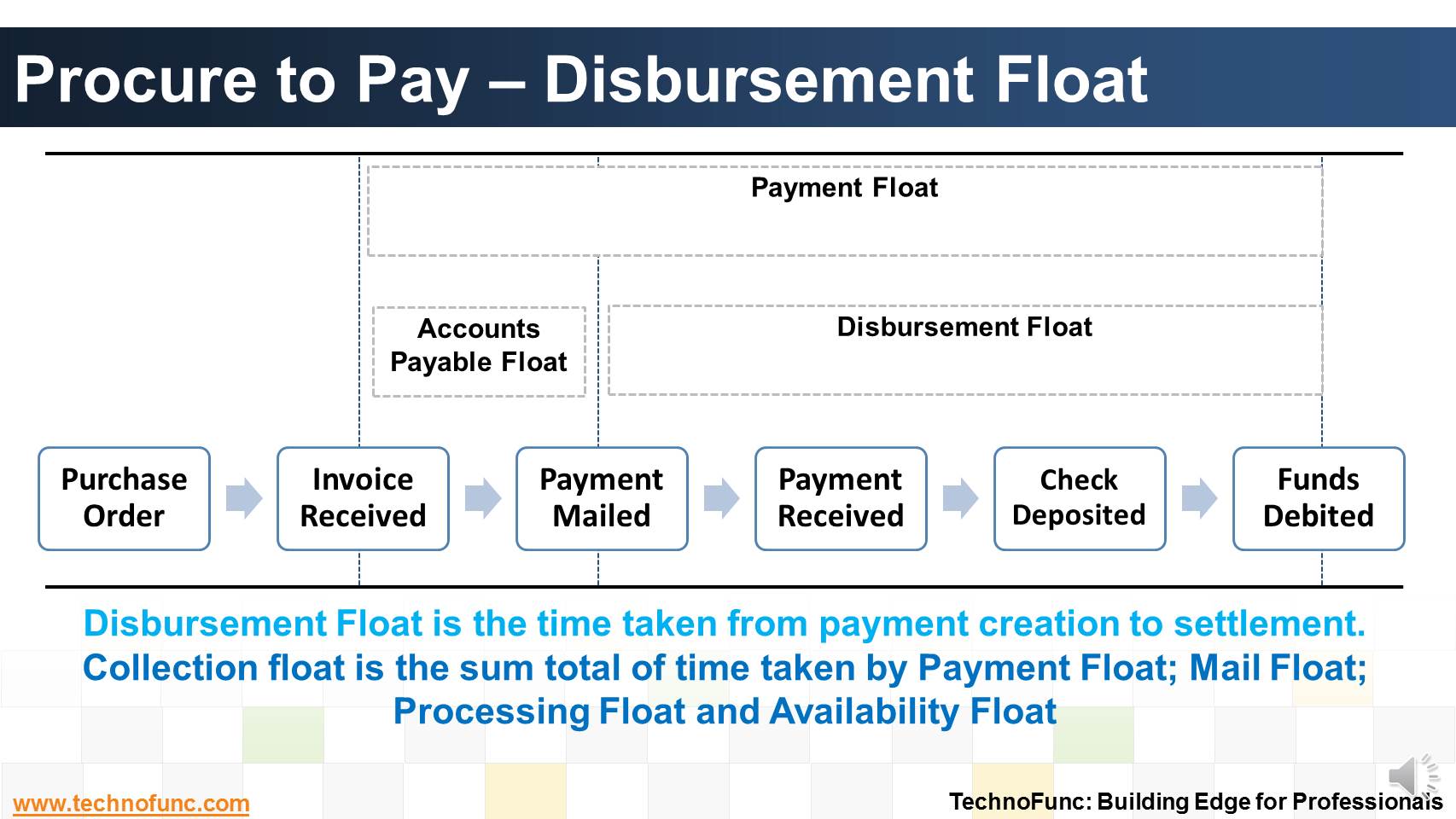- Home
- Business Processes
- Industry Knowledge
- Aerospace Industry
- Automotive Industry
- Banking Domain
- BFSI Industry
- Consumer/ FMCG Industry
- Chemicals Industry
- Engineering & Construction
- Energy Industry
- Education Domain
- Finance Domain
- Hospitality Domain
- Healthcare Industry
- Insurance Domain
- Retail Industry
- Travel and Tourism Domain
- Telecom Industry
- Leadership Skills
- eLearning
- Home
- Business Processes
- Cash Management
- Disbursement Float
Disbursement Float
Disbursement Float is the time taken from payment creation to settlement. Collection float is the sum total of time taken by Payment Float; Mail Float; Processing Float and Availability Float. Learn more!
Disbursement Float is the time it takes a company's payment to be created, mailed, received, deposited and presented to the drawee bank for settlement.
Thus collection float and disbursement float refer to the same processes and time intervals depending on point of view; one as a customer and another as a supplier.
For the company receiving a payment, collection float represents the time it takes an invoice to be prepared, to reach the customer, to receive payment and for the payment to clear the bank.
For the company making the payment, that same interval is disbursement float.Disbursement float consists of the following four components:
1. Invoicing and payment processing float includes both the time it takes the supplier to prepare and send the invoice, as well as the time the accounts payable department requires to process the invoice and create the payment.
2. Mail float is the time taken by postal or courier service to deliver the payment to the vendor.
3. Processing float is the time it takes the vendor to record the payment and deposit it into the bank.
4. Availability float is the time it takes the bank to clear the check and deduct the funds from the payee's bank balance.
Cash management focuses on shortening collection float and extending disbursement float, without impacting the positive customer and vendor relationships.
The skillful management of float contributes real bottom-line impact and benefit to the company.

Related Links
You May Also Like
-
Collection Float is the time spent to collect receivables. Collection float is the sum total of time taken by Invoice Float; Mail Float; Processing Float and Availability Float. Explore more!
-
What are the various sources of cash in an organization. Which sources increase the cash available with the enterprise and which sources results in outflow of the cash? Let us explore!
-
Technology has enabled the treasury function by providing various solutions to manage it's complicated tasks. This article explains various types of treasury management systems available in the market.
-
The topic for this lesson is "Introduction to Cash Management Process". We start with the learning objectives for building requisite functional expertise in cash management process.
-
Bank Reconciliation is a PROCESS to Validate the bank balance in the general ledger With Bank Statement. Learn the bank recon process.
-
Account Reconciliation – How? Learn the three key attributes to perfom account reconciliation.
-
Although there is no straight forward answer to the question, how to best organize a treasury function, this article provides an generic view of the way large MNCs creates departments or sub-functions within the treasury function.
-
Many different accounts are used in finance. Understand the representation and nature of clearing account in context of accounting, finance and ERP Systems.
-
The terms Treasury Management and Cash Management are sometimes used interchangeably, while, in fact, the scope of treasury management is larger and includes funding and investment activities as well. Learn all about Treasury Management here!
-
Introduction to Bank Reconciliation Process
These set of articles provide a brief introduction to Bank Reconciliation Process. This topic not only discusses the meaning of bank reconciliation process but also discusses how this process in handled in new age ERPs and Automated Reconciliation Systems.
Explore Our Free Training Articles or
Sign Up to Start With Our eLearning Courses

About Us
Learning
© 2023 TechnoFunc, All Rights Reserved











